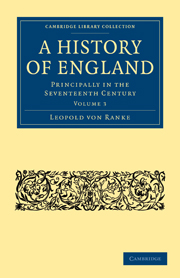Book contents
- Frontmatter
- Contents
- BOOK XI THE COMMONWEALTH IN ENGLAND, 1649—1653
- BOOK XII THE PROTECTORATE OF OLIVER CROMWELL, 1653–1658
- BOOK XIII FALL OF THE PROTECTORATE AND THE COMMONWEALTH. RESTORATION OF THE MONARCHY, 1658—1660
- INTRODUCTION
- CHAP. I Attempt to continue the Protectorate
- CHAP. II Attempt to form a Commonwealth on a new basis
- CHAP. III Royalist movements in the summer of 1659
- CHAP. IV Supremacy and constitutional projects of the Army
- CHAP. V Lambert and Monk. Restoration of the Rump Parliament
- CHAP. VI Anti-republican movement. Monk in the City
- CHAP. VII Recall of the King
- BOOK XIV THE FIRST FIVE YEARS UNDER CHARLES II. THE RESTORATION OF THE ANGLICAN CHURCH
- BOOK XV THE DUTCH WARS OF CHARLES II. ESTABLISHMENT OF THE PROTESTANT AND PARLIAMENTARY CHARACTER OF THE CONSTITUTION 1664—1674
CHAP. II - Attempt to form a Commonwealth on a new basis
Published online by Cambridge University Press: 07 June 2011
- Frontmatter
- Contents
- BOOK XI THE COMMONWEALTH IN ENGLAND, 1649—1653
- BOOK XII THE PROTECTORATE OF OLIVER CROMWELL, 1653–1658
- BOOK XIII FALL OF THE PROTECTORATE AND THE COMMONWEALTH. RESTORATION OF THE MONARCHY, 1658—1660
- INTRODUCTION
- CHAP. I Attempt to continue the Protectorate
- CHAP. II Attempt to form a Commonwealth on a new basis
- CHAP. III Royalist movements in the summer of 1659
- CHAP. IV Supremacy and constitutional projects of the Army
- CHAP. V Lambert and Monk. Restoration of the Rump Parliament
- CHAP. VI Anti-republican movement. Monk in the City
- CHAP. VII Recall of the King
- BOOK XIV THE FIRST FIVE YEARS UNDER CHARLES II. THE RESTORATION OF THE ANGLICAN CHURCH
- BOOK XV THE DUTCH WARS OF CHARLES II. ESTABLISHMENT OF THE PROTESTANT AND PARLIAMENTARY CHARACTER OF THE CONSTITUTION 1664—1674
Summary
The monarchical authority which had arisen on the basis of the new system had been shattered by dissensions between the very elements out of which it was composed. The restoration of the Commonwealth followed as a matter of course; but what form could it assume?
The astonishment felt was general, when the army, which had once forcibly dispersed all that remained of the Long Parliament, now resolved to restore it. But in reality it was not so surprising as it seemed. For during the last session the leaders of the two parties had come to an understanding with each other. Together they overthrew the Protectorate, which had attempted to subject them to the discipline of the old civil laws. They united in advocating the doctrines of the separatists, which once more found free scope upon English soil.
The army, which had played the decisive part in the recent revolution, now took the initiative in the work of reconstruction. A declaration drawn up at Wallingford House states ‘that they recollect that the members of the Parliamentary Assembly which sat until April 20, 1653, had been champions of the good old cause, and had been throughout favoured with God's assistance. They therefore felt it to be their duty to summon them once more to a renewed exercise of their former rights and powers.’ This step was mainly due to the influence of John Lambert, who had upheld the cause of the army from his seat in Parliament, and had in doing so allied himself with the Republican leaders.
- Type
- Chapter
- Information
- A History of EnglandPrincipally in the Seventeenth Century, pp. 234 - 241Publisher: Cambridge University PressPrint publication year: 2010First published in: 1875

